Grieving for the Guru (Journey to India, Part 6)
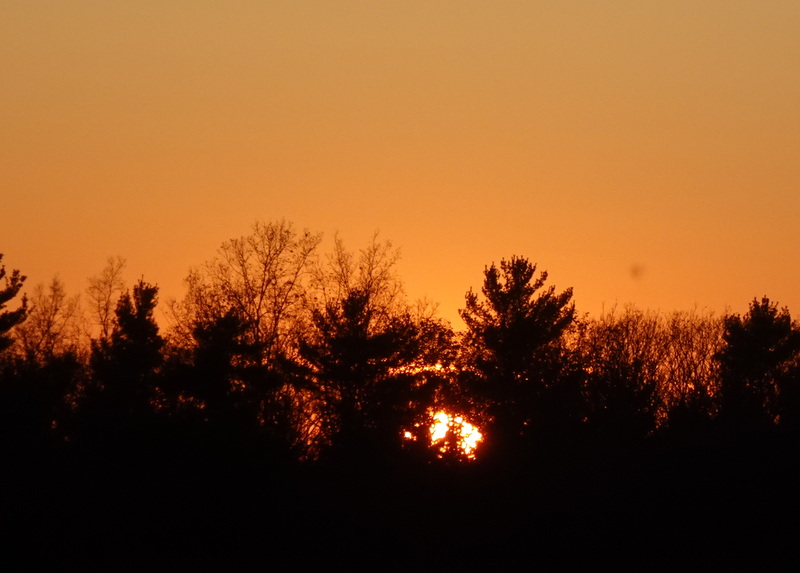
 Like so much else in India, Sri Sankaracharya’s funeral felt dreamlike and foreign, comforting and familiar.
Like so much else in India, Sri Sankaracharya’s funeral felt dreamlike and foreign, comforting and familiar.
When the main ritual began, priests poured offerings on the sage’s head. His bright silk shrouds were soaked with yogurt, honey, water and herbs, or ghee, one substance at a time. Between each anointing, the curtain closed and, half an hour later, it opened. His body had been cleaned and wrapped in fresh layers of silk. Chanting continued as another offering was poured on his body. Jasmine flowers scented the air.
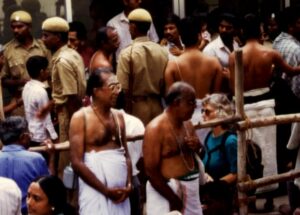 I stood in sun now, dripping sweat, mesmerized. As I watched, a quiet inner voice said, “This is the death of all the fathers. This is the death of all the fathers.”
I stood in sun now, dripping sweat, mesmerized. As I watched, a quiet inner voice said, “This is the death of all the fathers. This is the death of all the fathers.”
When the curtain closed, hundreds of men and women danced and sang. They wept and sobbed. They prayed and called out his name. “Sankara. Sankara. Guru-ji, Sankara.”
Despite the chaos, I felt deep peace as the words continued like a dream. “This is the death of all the fathers. This is the death of all the fathers.”
Where had these words come from? What did they mean? They were within me–a gift, a koan, a lucid dream? They continued on in a rhythmic calm voice, neither male nor female.
In the last ritual, ghee rolled down the sage’s dead face, over his glasses, and penetrated the silks. I watched the attendant’s devout grief-stricken faces as they poured yellow oil over their dead teacher before closing the curtain to clean his body. The ritual was a mystery, but their reverence and love were clear.
“This is the death of all the fathers.”
I didn’t try to understand what the words meant, although that would come later. Everything and nothing made sense as the sun sank in the west.
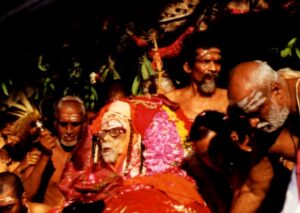 Suddenly, crowds surged toward the sage. Was this part of the plan? The attendants didn’t look alarmed and no one pushed against me, so I stood my ground. The crowd focused on their prayer: “Sankara, Sankara. Jai Sankara, Jai, Jai, Jai Sankara.” Jai or the victory that comes with spiritual liberation.
Suddenly, crowds surged toward the sage. Was this part of the plan? The attendants didn’t look alarmed and no one pushed against me, so I stood my ground. The crowd focused on their prayer: “Sankara, Sankara. Jai Sankara, Jai, Jai, Jai Sankara.” Jai or the victory that comes with spiritual liberation.
“Appa, Appa,” some called. “Father, Father.”
They carried his body down the mobbed lane to a building prepared for his burial. He was too saintly to be cremated, so the sage who had lived his life in poverty and slept on a thin pallet on a cement or wooden floor was buried in gold, jewels, and salt.
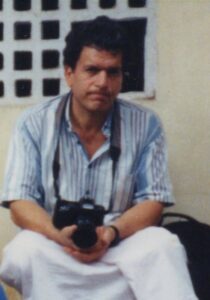
As the crowd moved toward the burial site, Vic appeared beside me. He’d pushed his way through the mob. “Let’s stay here,” he yelled with tears in his eyes.
“Yes,” I said as I sat on the dusty ground and wept.
“This is the death of all the fathers.”
After the burial, Vic and I walked down the quiet lane not sure if we were awake or dreaming. After a day of intense noise and emotion, the Mutt (or Hindu monastery) was quiet and deserted. As the inner mantra continued, all I wanted was water.
Have you attended an elaborate funeral ritual where no feelings were held back? This funeral was nothing like my Presbyterian childhood or my experiences with family and friends where the memorial is an opportunity to tell stories, listen to music, and describe a person’s life. Sri Sankara’s funeral focused on the ritual and open grief. What have funerals been for you and your family?
For earlier posts in this series, beginning with our first visit in 1990, see Out of Control: Pilgrimage to India, 1. Then, Out of Control: Journey to India, Part 2, Journey to India, Part 3, The Silent Blessing (Journey to India, Part 4) and A Sacred Grief Ritual, Journey to India, Part 5).

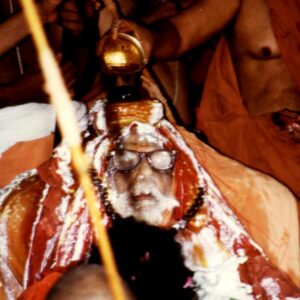

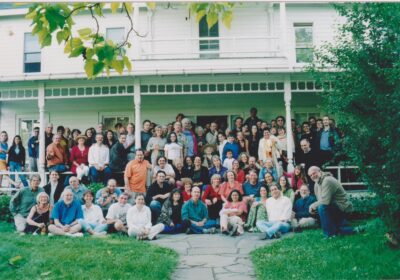
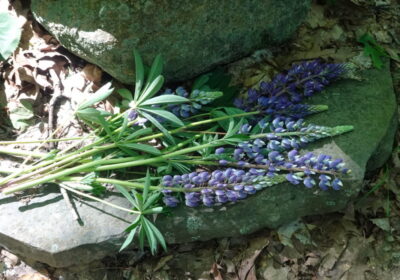
November 29, 2022 at 12:51 pm
anne
Dear Elaine, Somehow I missed responding to this post as well. I feel a bit like I was entering a dreamlike state as I read about these elaborate and beautiful funeral rituals that speak directly to the heart and soul. Now I will go read your post and learn about the spiritual significance of the words spoken to you by your inner guru: “This is the death of all the fathers.”
November 29, 2022 at 3:43 pm
Elaine Mansfield
No problem, Anne. It felt like I was receiving a vague order about where to find my next spiritual step. It wasn’t immediately clear why that message was being repeated, but there it was! I’m not sure the next blog completely clarifies the mystery since it still feels mystical and mysterious to me. I hope you have a wonderful Thanksgiving.
November 11, 2022 at 3:04 am
Susan scott
Thanks Elaine so much. Such a moving funeral with its rituals of ghee, oil and other, completely unlike any we of a ‘western’ world view are accustomed to. Interesting to me is the emphasis in Christian funerals of the celebration of the dead person’s life. Yes I get that but the grieving and mourning seems a bit sidelined. Though if I think of my own funeral I hope attendees have a wake and play a few of my favourite songs – eg Janis Joplin Bobby McGee, david Bowie:Sorrow, save the last dance for me – from the 1950’s but can’t remember remember right now. Inthe Jewish tradition there is a rending of the white shirt worn by men and sitting shiva for I think 7 days.
November 11, 2022 at 11:24 am
Elaine Mansfield
Susan, I hadn’t thought about my funeral or music (since my hearing is so lousy), but after reading your response, I’ll request “Dance Me To the End of Love” by Leonard Cohen. I love the words and the rhythm–with a mix of sorrow and love. A friend played cello at Vic’s funeral, and there were many stories and some poetry. The Adi-sankara tradition in India started 600 AD, so they’ve had lots of funeral planning time. It was orderly and the participants all knew what to do, but they also showed feelings and there was no problem with pausing the ritual if a dignitary came to pay respects and many came in helicopters and limos. And no problem if someone broke into song or tears or dance as they walked past the altar-like area where the dead guru was wrapped in silks. It was something to witness such open outpourings of grief and devotion. Many of my friends “sit shiva” after the death of someone they love. I didn’t do anything like that formally, but I gave myself months to grieve, surprised each day by how the heartache continued on. India taught me a lot, including about grief ritual. Thanks for your comment, Susan.
November 9, 2022 at 7:37 am
Aladin Fazel
Indeed they were moving moments! I have had such moments often because I lost all my family members. Although, I also learned that we are not bodies with souls; we are the soul within bodies. Thank you, Elaine, for sharing another part of your journey.
November 9, 2022 at 11:43 am
Elaine Mansfield
I agree we are not bodies but are souls incarnated in a temporary body. It was interesting that Sankara’s body was buried because of his holiness when nearly everyone is cremated in India. (I have now lost all my immediate family members except my sons and I never get used to it.)
Vic’s funeral was a mix of grief and laughter as people told stories about his life, including a story of him learning to wear a dhoti or lower body wrap worn by Indian men after our luggage was lost on our first trip. When I spoke, I told a story about Vic’s kindness during his illness. Best to you, Aladin.
November 9, 2022 at 6:32 am
Marian Beaman
It’s hard for me to relate to a funeral as you describe for the Guru. “This is the death of all the fathers, this is the death of all the fathers” does not make sense to me, and I wonder if you got more insight to the repeated saying. I can certainly imagine your need for water.
My experience of funerals since I’m an adult has been the renaming of them as a “celebration of life.” Usually there is a slide show on a repeating loop before the service. Then comes the singing of hymns and an invitation to tell stories about the deceased, usually humorous or recalling a fond memory. The minister then delivers a short homily, emphasizing the departed person’s hope of an eternal home in heaven.
The last funeral I attended was even more lighthearted. Gail had a huge family and a host of friends. After we signed the guest book, attendees could choose from various shades of lipstick and nail polish, symbolic of a woman who loved cosmetic beauty. There were bowers of flowers and happy reunions among the living. Gail had suffered from a long battle with cancer, and we were happy she was no longer suffering. In the end, children and young teens (relatives) gathered at the front and sang “Jesus Loves Me.” If ever a funeral could be joyous, this was one filled the bill.
November 9, 2022 at 11:33 am
Elaine Mansfield
It wasn’t easy for me to relate to the ritual either, Marian. I still don’t understand so much about what I witnessed that day and I couldn’t understand the words of most of the prayers or even hear the words over the noise of the crowd. It was a huge public occasion with 1/4 million people, but for me it was dream-like and brought more feelings than words. I’d spent six weeks in India by then, so I wasn’t surprised by the unknown. There was so much mystery in my experiences in India along with deep peace and inner quiet. You’ll understand more after my last blog on this experience on Nov. 22, since it took me months or even years to get the meaning of those words. At the time, I just heard the persistently repeated phrase and knew I was receiving an essential message.
You describe experiences with funerals that feel familiar, but now I often go to funerals with a Buddhist priest or a friend officiating. Lots of stories, music, and good food. No open caskets. Nothing at all like the experience in India. Your friend Gail’s funeral sounds joyful which reminds me of funerals in India which are a true celebration. (The ending coming soon–and I doubt I’ll attempt a series like this again, but it’s been an interesting experiment.)
November 9, 2022 at 1:14 pm
Marian Beaman
😀
November 8, 2022 at 11:31 pm
Sera J Smolen
Thank you Elaine for transporting me to this sacred, ancient ritual.
Your deep intuition that his was the death of all the fathers is truly profound.
much love Sera
November 9, 2022 at 11:15 am
Elaine Mansfield
Thank you, Sera. I appreciate your response and want to explain what those words meant to me and how they changed me. Since I didn’t want to make this post twice as long as normal, the best choice seemed to be adding another blog–and besides I haven’t mentioned the elephants. With love and peace.
November 8, 2022 at 1:22 pm
Deborah Gregory
Even better, there’s one more post to come! There’s so much ‘food for thought’ in this post and in your reply too, especially when you describe Sankara’s body as an altar on which to feast. Thank you so much for your kind words re the gift of my poem to my parents. In pure coincidence, I was writing about their deaths in my book this afternoon and didn’t know how to round that part off until I replied to your post earlier and wrote about the poem I had placed in their hands. What I feel I’ve gained by ‘forgiveness’ is the freedom to live an open-hearted life. Such joy, such sorrow.
November 9, 2022 at 11:13 am
Elaine Mansfield
You’ve gained so much through forgiveness, no matter how harsh the lessons. Thank you for sharing a little of what you’re learned. In one short blog post, I couldn’t give an adequate explanation of what the funeral ritual and those words meant to me or how they changed me, so I decided to add a last post to unpack my experience. That will be the final post about India for a while or maybe forever. His death was nearly thirty years ago and will always have an element of mystery and initiation, but the symbolic significance of those words moved me to a new spiritual focus.
November 8, 2022 at 9:22 am
Deborah Gregory
Wow, that was truly epic! Thank you, so much dear Elaine, for sharing all these sacred memories and wonderful, historical even, family photos of yours from these life-changing journeys you took with Vic to India. I’ve really enjoyed the whole series and did wonder how it would end! The deep Truth of your soul’s voice being “neither male nor female” caught this poet’s attention. I have to say that I found the food ceremonies fascinating and just read about why these rituals happen and how important ritual is.
On that note, following the deaths of both my parents in the last year and a half, neither chose to have a traditional funeral. So, each family member had to find their own way of marking these momentous occasions. After visiting the funeral home, I chose to have a poem of mine placed in their hands. A poem of love, acceptance and forgiveness, one I had penned two years earlier. Did I know … I wonder? In any case, this single act of marking their deaths brings me peace every day. Love and light, Deborah.
November 8, 2022 at 12:50 pm
Elaine Mansfield
I’m laughing, Deborah, because the funeral is over but the series isn’t quite ended. There will be one more blog in a few weeks to explain how I interpreted the message of the mantra I received that day and how it changed my spiritual direction. I also need to mention the comfort we found with the temple elephants because we stayed another week as we’d planned and visited the elephants and meditated at the temple every day. I like your thought about the soul’s voice being neither male or female and that’s just what it was and it brought an essential message and realization. The food ceremony was remarkable and I don’t understand it even though it felt perfectly right in that setting. His body became the altar since it wouldn’t have felt unusual to offer bowls of honey and ghee on a table of flowers. The amazing part was pouring the blessed gooey substances on the body of the sage. It was obviously an ancient ritual.
I love what you offered your parents, Deborah. A poet’s gift of forgiveness and acceptance of what was. I’m glad you had the poem ready for that moment. Your love is a huge gift as I consider their actions as parents, but the most important part (from my perspective) is what we gain through forgiving and how it heals the heart. Love, light, and a deep covering of oak leaves on the earth.